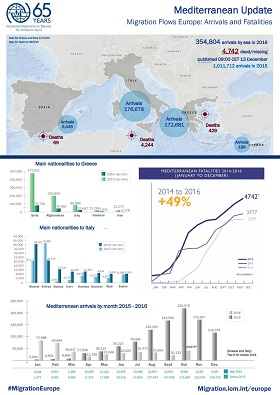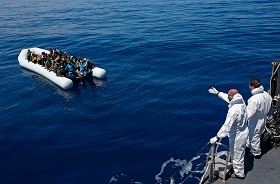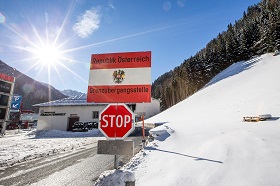The European Union's top court has rejected a challenge by Hungary and Slovakia to a migrant relocation deal devised in 2015.
As is common in Europe (except when imposing sanctions on Russia, it seems), the Court took its time and delivered its precedent-setting verdict only a few days ago. Furthermore, the Court stepped beyond the legal domain by ruling that the summit decision on quotas
- was taken in the "spirit of European solidarity";
- “actually contributed to enabling Greece and Italy to deal with the impact of the 2015 migration crisis”; and
- was a "proportionate" and suitable solution to the "problem originating in 2015".
Predictably, the court ruling was immediately hailed by those behind the decision on quotas. German Foreign Minister said he now expected all incompliant EU countries to implement the decision made at the summit two years ago "without delay". EU Migration Commissioner declared that it was "time to work in unity and implement solidarity in full." He added that failure to comply would result in the European Commission “taking the last step in the infringement procedure”, going back to the ECJ to bring legal action against the saboteur states, including heavy fines and other sanctions.
Budapest's reaction to the Luxembourg court ruling threw the seemingly well-established EU political correctness rules out of the window.
Hungary's Foreign Minister was furious, calling the verdict "appalling and irresponsible". He vowed to use all legal means against the judgement, which he said was "the result of a political decision, not the result of a legal or expert decision". "Politics has raped European law and European values. This decision practically and openly legitimates the power of the EU above the member states," he said. "The real fight starts now."
In a milder statement, Slovakian Prime Minister said his country's position on quotas also remained unchanged.
Ironically, the whole situation harks back to the communist past, which Hungary, Slovakia, Poland and other Eastern European countries gleefully and jeeringly ditched — for good, they thought — over a quarter of a century ago.
The European Union's top court has rejected a challenge by Hungary and Slovakia to a migrant relocation deal devised in 2015. The European Court of Justice overruled their objections to the compulsory fixed-quota scheme approved at the Union’s summit at the height of the crisis two years ago. Asylum seekers have since flooded Western Europe like Hurricane Harvey in Texas.
The news about the court ruling vividly illustrates the current state of the EU and thus merits a closer analysis.
Firstly, we are talking about illegal migrants from Africa and the Middle East. Would-be migrants in the rest of the world (including Russia) spend months knocking on doors of EU member state consulates in hope of securing visas, permits, invitations and other similar documents necessary to relocate to the European Union. By contrast, these migrants in their hundreds of thousands simply show up on the doorsteps of European homes: here we are, already on your side of the Mediterranean, do what you will but we are not going back.
To be clear: the plight of these unfortunate people fleeing war, hunger and poverty deserves compassion. However, this human response must not overshadow the obvious facts:
- The migrants are breaking the law or, more precisely, many laws in their home countries, in the EU, as well as in the transit countries (e.g. Morocco, Libya, Turkey);
- They do so knowingly;
- In addition to the heavy economic, social and cultural burden which this unprecedented influx of migrants imposes on European countries, it entails extra public order challenges and terrorism risks;
- The majority of migrants who end up in the EU are neither ready nor willing to contribute to the economy of the host countries as they often lack education, qualifications and skills; quite often there is also a language barrier. In any event, finding employment appears redundant since the word has long spread to the most remote outskirts of Africa that finding a job is not the ultimate objective - securing an official status which gives access to benefits is;
- In the eye of the migrants, obtaining such legal status — and the social benefits that come with it — fully offsets the risks, hardships and expenses of their long march to Europe. This, in turn, encourages new thousands to follow suit and undertake the same horrific journey;
- Africa and the Middle East — cradles of civilisation — have always been haunted by wars, violent ethnic conflicts, draughts, desertification, hunger and poverty. Yet only in the last two-three years uncontrolled migration from South to North has reached truly catastrophic proportions. The fact that this has happened at the time of a deep identity and institutional crisis in the EU is no coincidence. One cannot help but entertain the mystical thought of higher powers taking revenge on the European countries for the pain and suffering they imposed on African peoples during the colonial period.
Secondly, the European Union was completely unprepared for the dramatic surge in the numbers of illegal migrants from the South:
- Logistically - Europeans themselves acknowledge that the capacity and equipment available at transit centres and refugee camps are completely inadequate;
- Organisationally — the bureaucratic system operating across the EU and its member states has been unable to cope with the unprecedented number of illegal migrants, many of whom have conveniently 'lost' their IDs or other documents which would shed a light on their own and their families' circumstances and even their countries of origin;
- Institutionally — the EU governing bodies (Council of the European Union and the European Commission) have never encountered an external challenge of such scale and complexity and have so far been unable to work out an even remotely effective and adequate solution to it;
- So much for the post-Christian ‘values' (the pride and joy of the European Union as a whole, and its veteran member states in particular), which has served as a basis of its 'soft power' for over half a century. The resolve to welcome, resettle and assimilate all the destitute and the suffering has been crushed by the harsh reality of an overwhelming influx of migrants, the majority of whom are not prepared to adopt these very 'values' as their own.
In September 2015, when it became clear to everyone in Europe that the wave of illegal migration was spinning out of control and turning into an avalanche, the EU summit adopted a decision setting mandatory resettlement quotas of asylum seekers for each member state. Hungary was told to take 1,294 people, Slovakia 802 etc. Hungary, Slovakia, the Czech Republic and Romania — full members of the EU with supposedly equal powers — voted against. Nevertheless, the issue was decided by a majority vote — a system usually used on issues that do not affect national sovereignty. Other members (mostly the larger states and veteran EU countries) declared that this was not a matter of national sovereignty and security, and therefore the consensus rule did not apply.
Predictably, Budapest, Bratislava, Bucharest and Prague were utterly dissatisfied with the imposed solution and started sabotaging it. Their case was supported by Poland, where a right-wing government has come to power since the 2015 deal. Despite pressure and threats of sanctions from the European Commission, Poland and Hungary have refused to take a single asylum seeker under the arrangement (Hungary has accepted 444 since the beginning of 2017 but insists it will not co-operate with the "solidarity" scheme). Slovakia has taken only about a dozen, while the Czech Republic has refused to take any for the past year. In a related move, the disagreeing countries filed a complaint with the European Court of Justice. The grounds for the appeal were clear:
- The decision on mandatory quotas was made in violation of established procedures (it should have been taken by consensus);
- The crisis a priori is not a problem of their making and imposing quotas is not a suitable response;
- The influx of migrants compromises their national security as it exposes them to a greater risk of Islamist terrorism and represents a threat to their homogenous societies.
As is common in Europe (except when imposing sanctions on Russia, it seems), the Court took its time and delivered its precedent-setting verdict only a few days ago. The ECJ dismissed in their entirety the arguments brought by the complainants. It rejected the claim that any procedural mistakes were made in 2015 and that the scheme should have been adopted unanimously. Furthermore, the Court stepped beyond the legal domain by ruling that the summit decision on quotas
- was taken in the "spirit of European solidarity";
- “actually contributed to enabling Greece and Italy to deal with the impact of the 2015 migration crisis”; and
- was a "proportionate" and suitable solution to the "problem originating in 2015".
Predictably, the court ruling was immediately hailed by those behind the decision on quotas. German Foreign Minister said he now expected all incompliant EU countries to implement the decision made at the summit two years ago "without delay". EU Migration Commissioner declared that it was "time to work in unity and implement solidarity in full." He added that failure to comply would result in the European Commission “taking the last step in the infringement procedure”, going back to the ECJ to bring legal action against the saboteur states, including heavy fines and other sanctions. Hungary, Poland and the Czech Republic are already facing legal action by the European Commission for their intransigence over the relocation of asylum seekers.
Budapest's reaction to the Luxembourg court ruling threw the seemingly well-established EU political correctness rules out of the window. Hungary's Foreign Minister was furious, calling the verdict "appalling and irresponsible". He vowed to use all legal means against the judgement, which he said was "the result of a political decision, not the result of a legal or expert decision". "Politics has raped European law and European values. This decision practically and openly legitimates the power of the EU above the member states," he said. "The real fight starts now."
In a milder statement, Slovakian Prime Minister said his country's position on quotas also remained unchanged.
It should be noted that the ECJ’s decision is final and cannot be appealed.
Ironically, the whole situation harks back to the communist past, which Hungary, Slovakia, Poland and other Eastern European countries gleefully and jeeringly ditched — for good, they thought — over a quarter of a century ago. Not only did they relinquish considerable parts of their sovereignty to unelected bureaucrats in Brussels — they also found themselves bullied by bigger EU member states who impose their view of “solidarity”, just as the ruling Communist parties did prior to the fall of the Socialist bloc. A Soviet tragedy has turned into a European farce.
In the Soviet era, only two opinions could exist: the one [currently] held by the ruling party and the wrong one. The situation in the European Union today is very similar, only in addition to the correct opinion (held by Brussels and Berlin) and the incorrect opinion (held by Hungary, Slovakia, Poland, Romania), there is a third view. The humanitarian organisation Medicins Sans Frontieres ('Doctors Without Borders') has strongly criticised the EU summit decision to impose mandatory quotas and support the Libyan authorities in countering illegal migration. "Libya is not a safe place and blocking people in the country or returning them to Libya makes a mockery of the EU's so-called ‘fundamental values’ of human dignity and rule of law", it said. Amnesty International tweeted that the agreement would cause "horrendous suffering". These and other civil society outfits with similar views are primarily concerned with the migrants' safety and comfort on their way to Europe and with their speedy and smooth resettlement in the EU.
The European Union and its member states will have to deal with this debateable logic. It should be noted that expert opinions have been voiced 1 , identifying solutions to the surging levels of migration from Africa and the Middle East, other than the ones approved by the aforementioned EU summit. Migrants have a lesser preference for the shorter and therefore safer (as compared to the 'Italian' and the 'Greek') 'Spanish' route, which clearly is a result of well-coordinated efforts of the Moroccan and Spanish coast guards, supported by NATO naval presence in Gibraltar. It is a priori impossible to enter Europe from the Middle East and North-East Africa through Israel. The Turkish authorities, who have — so far — been implementing the agreement with the EU on countering illegal migration, are notably more effective and efficient in dealing with the issue than their Italian and Greek counterparts.
Finally, a few words about the 'proportionality' of the decision to impose quotas, which was upheld by the European Court of Justice. At its summit two years ago the EU agreed to allocate €200m to the failing government in Libya, hoping that the money will boost the latter’s capacity to disrupt people-smuggling networks and turn back migrant boats. Following the violent ousting of Gaddafi with US and EU help, the authorities in Tripoli have been able to control but a small part of the country. They are thoroughly corrupt and completely incapable of reigning in the highly profitable industrial-scale trafficking of illegal migrants to Europe. It is hard to say whether the people behind the proposal seriously considered such meagre budget sufficient to meet the challenge of resettling 160,000 migrants within two years (this figure served as a basis for the allocation of national quotas) and repatriating the rest. This no longer seems relevant, as, according to official data, some 1.7 million people have arrived in the EU since 2015. To date, only 28,000 of them have completed the established procedure and formally and fully resettled in several EU member countries.







